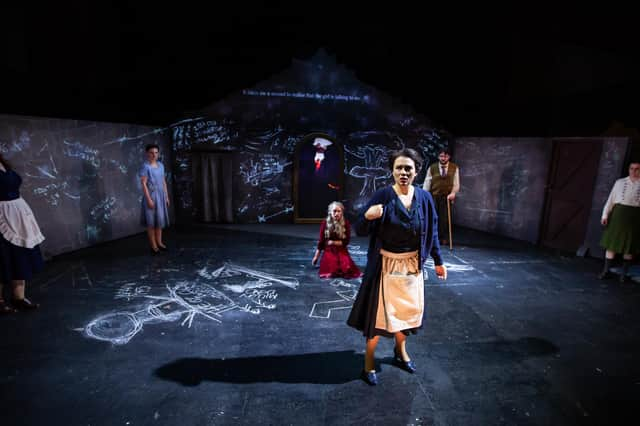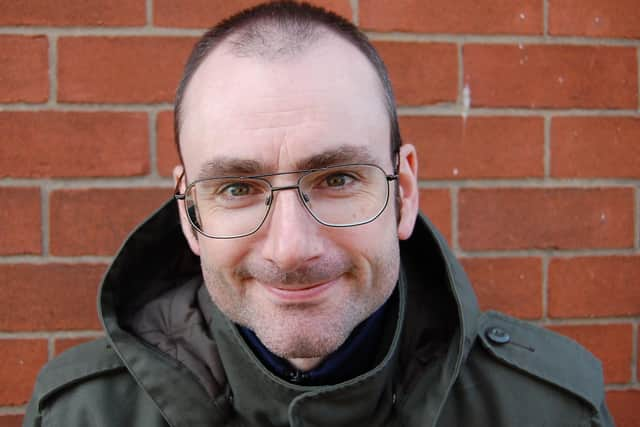How lockdown forced Douglas Maxwell to reimagine his WW2 drama The Assumption


When Douglas Maxwell began - back in 2019 - to write his new play for the final-year students on the Royal Conservatoire of Scotland’s groundbreaking performance degree course in British Sign Language and English, the limitations of lockdown were the last things on his mind. Like many writers, he had come to see writing for student companies as a way of working with larger casts than are often affordable in professional theatre; and in tackling the new challenge of working with a company of D/deaf performers – and of writing a play that would be suitable for a small-scale tour around Scotland, as well as a premiere in Glasgow – he allowed his imagination to roam far and wide, developing the idea of a slightly spooky genre thriller, set during the Second World War in an old house somewhere in Scotland that has been requisitioned by the government for mysterious, and perhaps questionable, war work.
At first, Maxwell thought of making the family who live in the house deaf characters; but the students gave that idea a firm thumbs down, emphasising that they want to be able to play as wide a range of characters as their hearing counterparts, and not to be confined to playing people who are deaf. So Maxwell began work on a second draft; and it was at that point that the pandemic struck, forcing the first of many changes of plan, in a pattern familiar across UK theatre in 2020.
Advertisement
Hide Ad“The first change I had to make,” says Maxwell from his home in Glasgow, “was to rewrite the whole piece as a series of monologues, and that was actually extremely difficult. I had written what was really a kind of action thriller, with a lot of movement and quick-fire interaction between characters, and that mood had to change completely. Neither I nor the director, Jonathan Lloyd of Solar Bear, really thought that worked very well; so then we began to nuance it a bit, introducing some distanced dialogues as well as monologues, and varying the pace.


“It’s been a fascinating process; and of course working with performers who are using BSL to play hearing characters subtly changes the style and possibilities of the show – it makes it less naturalistic and filmic, and more theatrical. So I feel as though I’ve learned a lot.”
In a year when so many performance projects have had to be made and recorded entirely online and in isolation, the RCS students were delighted that – thanks to close co-operation between the RCS and the Tramway, with its huge main performance space – they were able to rehearse the final version of the play in the theatre, and record it “as live” in the Tramway space. “It looked beautiful,” says Claire Lamont, head of the course at the RCS, paying tribute to the show’s designer Ruth Darling, and lighting designer Lizzie Powell. “And it was just wonderful to get back into a theatre space, even though the actors had to keep a strict distance from each other. This course began in 2015, with the first cohort of students graduating in 2018, and it remains unique – certainly in the UK, possibly in Europe. We only recruit once every three years, and this is the final year for this second cohort, who arrived in 2018; so they’ve had a very unusual time, and we’ve all had to work hard to make sure that it’s been as rich an experience for them as possible.”
Students Amy Murray and Claire Weatherall are certainly both acutely aware of the downsides, and occasional unexpected upsides, of their unique final year. They both talk about the deep disappointment of losing the chance to go on tour across Scotland; and about the stress of trying to create coursework online, sometimes with partners who had gone home to different countries, and were not even in the same time zone.
“We have had a chance to acquire all kinds of new skills, though,” says Claire Weatherall, “and not only in online film-making. For example, my character in the play, Maria – she’s usually called The Prisoner – has been through a very traumatic experience, with bruises on her face and body. And because the pandemic meant we didn’t have the usual amount of help with makeup, I had to learn a lot about doing that myself, and creating the right effect.”
“It was also really interesting working on a play set in the 1940s,” says Amy Murray, whose character is a lively woman called Molls. “You have to get the hair right, the clothes, even the way they walk and move, which is subtly different from today. We’ve learned so much about movement and visual vernacular on this course – it’s been wonderful. It was also so interesting to work on a text that made you aware of the complexity of the Second World War. We all think we know the story of that war; but this play reminds you that it was not simple at all.”
Advertisement
Hide AdAnd for Douglas Maxwell, there’s a real sense of fulfilment in the fact that the students were finally able to rehearse and perform the play in a theatre, even if there was no audience present. “I think it was incredibly important for the students that they got the chance to carry this project through to the end,” says Maxwell, “to an actual performance, however strange the circumstances. And now, I’m really looking forward to watching the film; and seeing how it works, at the end of such a complex journey.”
The Assumption will be available on YouTube from 9 December 2020 to 11 February 2021. See the RCS and Solar Bear websites and social media for further details.
A message from the Editor
Advertisement
Hide AdThank you for reading this story on our website. While I have your attention, I also have an important request to make of you.
The dramatic events of 2020 are having a major impact on many of our advertisers - and consequently the revenue we receive. We are now more reliant than ever on you taking out a digital subscription to support our journalism.
To subscribe to scotsman.com and enjoy unlimited access to Scottish news and information online and on our app, visit https://www.scotsman.com/subscriptions
Joy Yates, Editorial Director